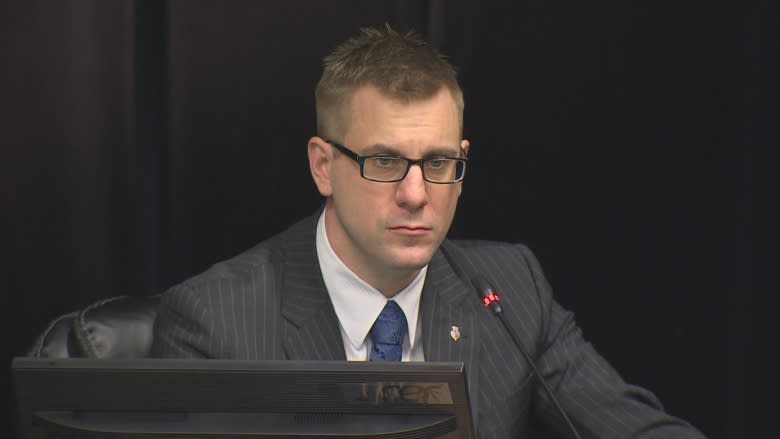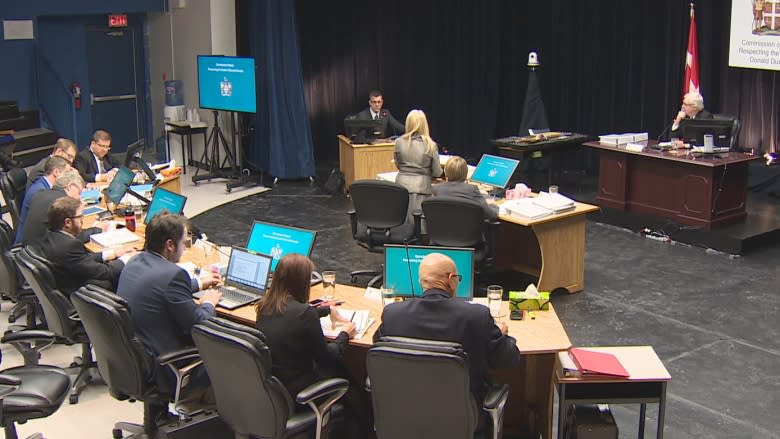Joe Smyth says communications breakdown left him without 2nd officer on Dunphy visit
The police officer who shot and killed Don Dunphy in his Mitchells Brook home on Easter Sunday 2015 says he would have taken backup if he had a crucial piece of information about Dunphy.
On April 5, 2015, Const. Joe Smyth called the RNC Communications Centre whle he was driving to Mitchells Brook. He asked for background information on Dunphy. He received his driver's licence and registration information and learned that he didn't have a registered firearm.
But Smyth told a public inquiry into the shooting on Tuesday that he wasn't aware of a RCMP file flagging Dunphy for "violence, drugs."
Those flags related to charges of marijuana possession and uttering threats, charges that were dropped. Dunphy did not have a criminal record.
Smyth said if he had known that, he would have taken another officer with him.
While Smyth believed that information would have been given to him as part of a background check, RNC communications officer Mark Oram said it was something Smyth would have had to ask for specifically.
Smyth went Alone
Smyth went alone to Dunphy's home in plain clothes because he believed that would improve his chance of building a rapport with Dunphy.
Responding to questions from Commission co-counsel Sandra Chaytor, Smyth explained why he declined an offer from an RCMP officer to join him on his visit to Mitchells Brook.
Smyth said he believed a uniformed officer might have made Dunphy uncomfortable.
"It's a symbol of authority. He might have thought we were there to arrest him," said Smyth.
"I felt a uniformed officer would make it harder to build rapport with Mr. Dunphy."
Smyth said he didn't believe going to Michells Brook would put him at physical risk.
Inside Dunphy home
Smyth told the inquiry that Dunphy allowed him to come inside his home but became agitated during their conversation.
He said 'You're a f--king puppet and government is the reason I'm living this way,' Smyth said.
The RNC officer said he noted the stick that Dunphy kept — other witnesses have said he had it to guard his homegrown medical marijuana — and told Dunphy it was fine as long as it stayed where it was, on his left side.
Smyth said he did not ask Dunphy if he had a gun. He described the house as smelling of cat feces and vomit, and was reluctant to sit down, so he stood by the mantel while Dunphy sat in his chair.
When the inquiry resumes Wednesday, Smyth is expected to be questioned about the moments leading up to the shooting inside the Dunphy home, and why he fired several shots, killing Dunphy.
Smyth had gone to St. Mary's Bay after Dunphy posted tweets critical of then-premier Paul Davis and other provincial politicians. Donna Ivey, a communications official in Davis's office, forwarded one of those tweets to Smyth.
Did you interpret the tweet as a threat? asked Chaytor on Tuesday.
Smyth replied "no."
He said he understood that Dunphy was tweeting about not hurting the feelings of family members but wanted to ask about Dunphy's intentions.
Workplace NL's executive director, Tom Mahoney, said in his statement to police that Smyth told him "He (Smyth) was investigating a threat that was made."
Smyth said that may have been a misunderstanding.
RCMP Const. Adrian Cox also recorded in his notes that Smyth was investigating threats that Dunphy made against the premier.
Smyth said he believes Cox misinterpreted what he said when he phoned Cox.
Chaytor asked, "Would you have done things differently if you believed there was a threat?"
"Yes, I would have taken another uniformed officer," replied Smyth. "If I felt it was a threat, I would have ensured the premier and his family were briefed about it."
Follow the testimony in our live blog.





